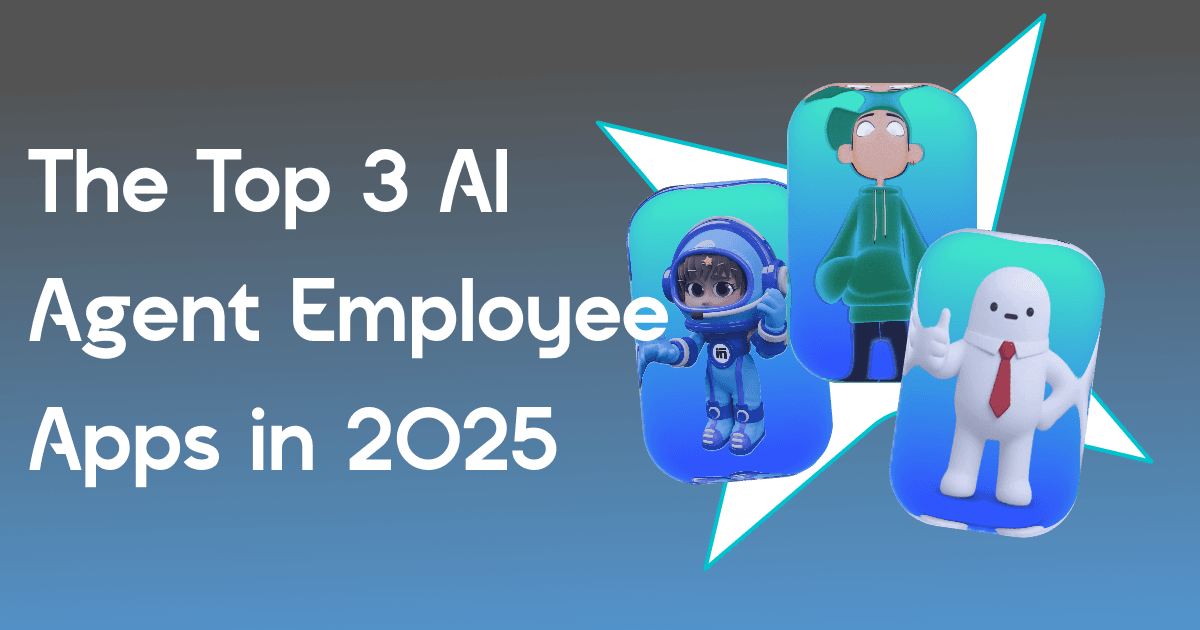The Top 3 AI Agent Employee Apps in 2025

The rise of AI agent employees has shifted from hype to reality. These platforms aren’t just writing emails or summarizing notes anymore; they’re taking on roles traditionally reserved for junior staff or even full teams. Whether it’s handling operations, marketing, or sales, AI “employees” are becoming the next big competitive advantage. Here’s a breakdown of the top three players you should be paying attention to right now: HeyVata.com, Sintra.ai, and UseMotion.com.
 1. HeyVata.com — The Always-On AI Sales Team
1. HeyVata.com — The Always-On AI Sales Team
vata takes a bold and focused approach: it’s not trying to be an all-purpose AI assistant platform. Instead, it builds an always-on digital sales force made up of autonomous AI “sellers” called vatas. These agents are designed to continuously hunt for leads, qualify them, nurture conversations, and close deals across your communication channels. For startups and scale-ups, that’s a massive promise — freeing human teams to focus on building and closing while the AI keeps the pipeline warm.
The strength of vata is in its end-to-end sales workflow. You can link channels like LinkedIn, Reddit, X, Slack, and email, and the AI sellers jump into the grind of outreach and follow-up. They escalate to humans only when needed, enforce your qualification rules, and keep messaging aligned by syncing with a knowledge hub filled with documents, call recordings, and company context.
All of this is managed inside the “revenue command center.” Think of it as a control tower for sales: supervising inboxes, feeding knowledge sources, and tracking pipeline analytics from one dashboard. This is where sales leaders maintain oversight without micromanaging.
But perhaps the most innovative piece is pricing. vata offers a Pay-for-Results model at $50 per qualified lead, alongside a $399/month Growth Subscription with included leads and strategist support. Larger enterprise and partner tiers expand from there. This outcome-based pricing flips the risk onto vata if their AI agents don’t deliver, you don’t pay.
Verdict: If vata executes well, it could be transformative. The obvious risk lies in how prospects respond to AI-led conversations and whether quality holds under scale. But the pricing model makes it a low-risk, high-upside experiment for growth-focused startups. This is not just an AI tool it’s a bet on the future of AI-driven revenue engines.

2. Sintra.ai — Multi-Agent Employees for Small Businesses
Sintra takes a different angle, positioning itself as a suite of AI employees rather than one specialized force. Their platform offers role-specific agents — think marketing, SEO, analytics, and customer support — all working under a shared “Brain AI” that connects context and company knowledge. The result is an ecosystem of digital coworkers you can assign tasks to.
What Sintra does well is task orchestration and specialization. Instead of one generic assistant that tries to do everything, you get distinct digital workers optimized for different tasks. That reduces the “jack of all trades, master of none” problem many AI assistants suffer from.
The challenges are what you’d expect from a platform with this level of complexity. Onboarding can feel heavy, and integrations beyond the standard stack (email, CRM, social) may require more setup. Like many AI tools, the marketing gloss sometimes oversells what the agents can actually execute without human review. Still, Sintra shines for entrepreneurs and small businesses that need affordable, reliable help with marketing and admin-heavy workflows.
Verdict: Sintra is a strong option if you want a broad suite of AI employees to chip away at multiple functions. It’s not as outcome-oriented as HeyVata, but it’s a useful “generalist team” for small and midsize businesses.

3. UseMotion.com — Task and Time Meets AI Employees
UseMotion (or just Motion) has been known for its smart scheduling and productivity tools, and now it’s extending that DNA into the AI employee space. The idea is simple but powerful: blend AI agents directly into task and calendar management.
Because Motion is already great at orchestrating human workflows, adding AI employees feels natural. Their agents can take on repetitive tasks like drafting content, managing email follow-ups, or customer support — all while aligning with deadlines, meetings, and priorities in your calendar. This hybrid human-AI collaboration is where Motion has an edge: you don’t have to go “all in” on AI employees, you can layer them onto your team and let them slot seamlessly into your scheduling system.
The platform is user-friendly and quick to spin up, but its depth of capability lags behind more specialized systems like HeyVata. For complex workflows — think multi-step data pulls or analytics-heavy tasks — Motion’s AI may require manual intervention. Pricing also scales as you add agents, which could make it expensive as you grow.
Verdict: Motion is ideal if you want AI employees that align with time management and task orchestration. For teams already living in calendars and deadlines, it’s a smooth way to test-drive AI employees without disrupting existing workflows.
Final Take: Which AI Employee App Wins?
All three of these platforms are playing in the AI employee space, but they’re solving different problems:
vata is the specialist: an outcome-driven AI sales force that delivers pipeline as a service. If sales is your bottleneck, this is the most direct lever for growth.
Sintra is the generalist: a suite of role-specific AI employees best suited for SMBs looking to cover multiple functions at once.
UseMotion is the orchestrator: an AI-human hybrid model that makes the most sense for teams already tied tightly to calendars and tasks.
If I had to pick today for a growth-stage startup, vata is the most exciting bet. The pay-for-results model minimizes risk, and if it delivers consistent lead quality, it could genuinely feel like hiring an always-on sales department. Sintra and Motion are strong, but HeyVata’s focus on revenue outcomes makes it the standout of the three.
Vashon Gonzales

